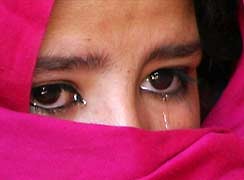
This week, the New Yorker ran a piece on Saad Mohseni’s media company Moby Group – owner of Afghanistan’s most popular channel, Tolo TV. This channel stands out for its controversial content and its revolutionary portrayals of women and relationships. With millions of viewers and its envelope-pushing programs, Tolo TV has the potential to change decades-standing social norms in Afghanistan.
Launched in 2004, Tolo TV is home to Bollywood soap operas that portray love marriages and not only show unveiled women, but women with bare midriffs. It hosts Afghanistan’s most popular program, Afghan Idol (analogous to American Idol) which reaches a third of the population. And, despite Mohseni’s initial support for President Karzai, Tolo TV has presented critical news coverage of alleged voter fraud and corruption during the suspect 2009 elections.
According to the article, the channel is also the target of both fundamentalists and the government for its “un-Islamic” programming. Afghanistan’s Ulema Council deemed some shows as inappropriate and the minister of for information and culture demanded that Tolo TV remove the offending soap operas (even though the channel already censors sex scenes and blurs cleavage and even Hindu idols). Mohseni refused to comply and later faced criminal charges for keeping the soaps on the air. This act of defiance was not only a boon for free speech, but was instrumental in keeping more progressive (though admittedly not perfect – it would be more encouraging to see more women doctors, engineers and professors on air and not just measure progress through clothing women wear) portrayals of women on the air.
For better or worse, the media has a significant role in changing stereotypes and societal norms, and even influencing our behavior. The media in the US provides prominent examples of its reach into the personal lives of viewers. The Cosby Show and Fresh Prince of Bel-Air were some of the first popular television programs to depict educated, upper and middle class African American families, breaking decades-old stereotypes that had permeated popular culture for years. Sex and the City (despite the franchise’s dreadful movies, 1 and 2) was groundbreaking in its portrayal of financially successful and sexually empowered women. Formerly taboo topics ranging from STDs to sexual orientation, and even sex toys were tackled on the show. The media even influences the names expecting parents pick for their children. According to the Social Security Administration, Twilight monikers Jacob and Isabella were the two most popular baby names of 2009. By providing progressive programming, Tolo TV can too have widespread clout in Afghanistan. Tolo TV, despite its threats of censorship by the government, is in a great position of power and with that, has the potential to bring progressive change to Afghan society. By challenging the government in its refusal to remove programming and by portraying women, as well as male-female relationships in less conservative light, the channel offers a counterpoint to the androcentric norms that have been used to repress women for years.
Photo Credit: Flickr (image of interview on Tolo TV)













